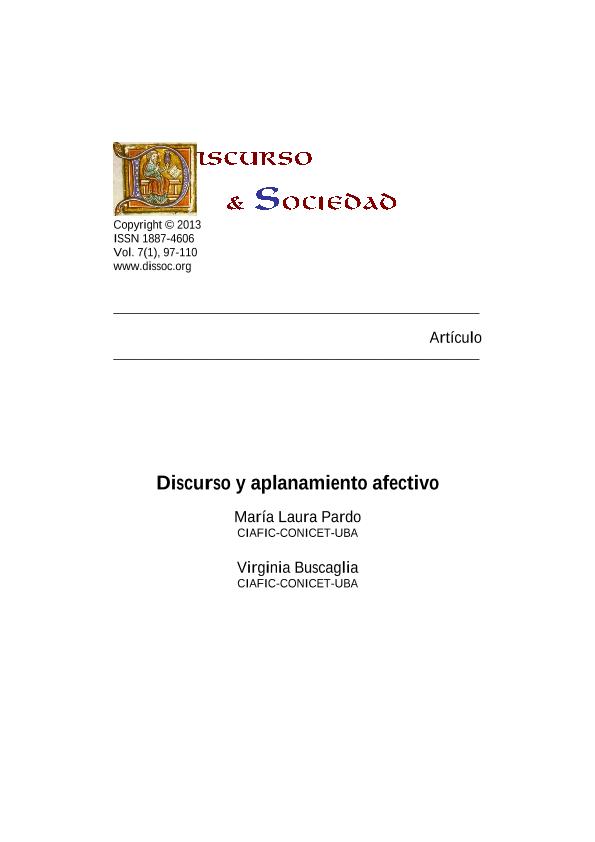Artículo
En este trabajo nos proponemos investigar el llamado aplanamiento afectivo (tal como lo entiende la psicología y la psiquiatría) en sujetos que padecen algún trastorno psicótico en diferentes contextos (Sujetos en situación de indigencia que viven en la calle y pacientes de nosocomios privados y públicos). El aplanamiento afectivo consiste en la imposibilidad del sujeto de reaccionar ante los objetos, situaciones y personas. Quienes lo padecen, presentan incapacidad afectiva y, por lo tanto, incapacidad de expresar las emociones verbalmente. Cuestionamos que cuando la psiquiatría incluye el discurso, en sus descripciones sintomatológicas, ya sea en su aspecto exaltado, en lo que denomina ‘síntomas positivos’ de la psicosis, o en su contraparte, la pobreza o falta de discurso en lo que denomina ‘síntomas negativos’, lo hace produciendo una división a partir de la presentación fenomenológica de esos síntomas, pero no toma en cuenta que el discurso (lenguaje en uso) es un componente más macro que queda fuera de esta división, que va mucho más allá, la traspasa. Por lo que no se puede sostener que quien tiene aplanamiento afectivo tenga necesariamente “aplanamiento discursivo”. Cantidad de palabras no es calidad de discurso. El análisis lingüístico se realiza mediante el componente Actitud de la teoría de la valoración (Iedema et al, 1994; Martin y White, 2005). La metodología es cualitativa y el marco teórico es el del Análisis Crítico del Discurso especialmente en su vertiente latinoamericana (Pardo Abril, 2008; de Melo Resende, 2010; García da Silva y Pardo Abril, 2010; Pardo, 2011). In this paper we propose to investigate the so-called affective flattening (as understood by psychology and psychiatry) in subjects with psychotic’s symptoms in different contexts (Subjects are destitute people living on the street and patients at private and public asylums). The affective flattening is the inability of the person to react to objects, situations and people. These subjects present affective inability and therefore inability to express their emotions verbally. We question that when psychiatry includes speech, in their symptomatology descriptions, either in its exalted aspect, in what is called positive symptoms of psychosis, or its counterpart, poverty or lack of speech in what is called negative symptoms, does it by producing a split from the phenomenological presentation of these symptoms, but does not take into account that discourse (language in use) is a macro component that is out of this division, which goes far beyond. What is impossible to claim is that who have affective flattening not necessarily have "flattening discourse", quantity is not speech quality. Linguistic analysis is performed by the component Attitude of the Appraisal theory (Iedema et al, 1994, Martin and White, 2005). The methodology is qualitative and the theoretical framework is Critical Discourse Analysis especially with a Latin American perspective (Pardo Abril, 2008, de Melo Resende, 2010; Garcia da Silva and Pardo Abril, 2010, Pardo, 2011).
Discurso y aplanamiento afectivo
Título:
Discourse and affective flattening
Fecha de publicación:
04/2013
Editorial:
Universitat Pompeu Fabra
Revista:
Discurso y Sociedad
ISSN:
1887-4606
Idioma:
Español
Tipo de recurso:
Artículo publicado
Clasificación temática:
Resumen
Archivos asociados
Licencia
Identificadores
Colecciones
Articulos(SEDE CENTRAL)
Articulos de SEDE CENTRAL
Articulos de SEDE CENTRAL
Citación
Pardo, Maria Laura; Buscaglia, Virginia Luisa; Discurso y aplanamiento afectivo; Universitat Pompeu Fabra; Discurso y Sociedad; 7; 1; 4-2013; 97-110
Compartir




